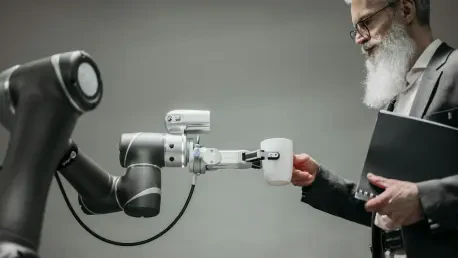Imagine robots not as mere mechanical devices but as companions capable of emotional interactions that rival those of humans. Recent developments in robotics, highlighted by the introduction of robots such as Cozmo, are radically transforming our perceptions of artificial intelligence by engaging in social games, fundamentally altering the landscape of human-robot interplay.
Human-Robot Connection: More Alike Than Different
Cozmo, an expressive robot, and your average person share more similarities than one might assume. At the heart of these commonalities is the ability to engage socially, as illustrated by groundbreaking research. This study, featured in the Journal of Experimental Psychology: Human Perception and Performance, explores how playing games with robots can elevate them from the status of tools to that of human-like entities.
Social engagement with robots is becoming more than a novelty; it’s a vital component of our day-to-day lives. Robots, once considered mere machines aiding in technical tasks, are emerging as emotionally engaging companions in homes, hospitals, and offices. But acceptance hinges on their ability to interact on a human level. The importance of this transformation lies in the wider societal embrace necessary for robots to be effective across various realms, from caregiving to customer service.
Games Paving the Way for Human-Like Interaction
Cozmo, designed to express emotions, revolutionizes how humans perceive robots. Games facilitate natural interactions, acting as icebreakers that demystify the robotic nature. A study at the University of East Anglia showed significant changes in perception among participants who played games with Cozmo, noting its human-like traits. The playful interaction led humans to see Cozmo as a thoughtful companion rather than a remote-controlled device.
In this study involving over 100 participants, the integration of play was crucial. During interactions, Cozmo’s vibrant personality traits such as happiness and curiosity altered how humans viewed its actions, perceiving them as independent rather than pre-programmed. Engaging in games challenged the conventional perception of robots, merging the realms of technology and human behavior seamlessly.
Insights from Psychology: Beyond Programming
Dr. Natalie Wyer, from UEA’s School of Psychology, emphasizes the critical role of social context in fostering humanizing perceptions of robots. According to Dr. Wyer, the profoundly human perception of robots arises not from their technological complexity but from meaningful social engagements. Quotes from participants reveal interactions that reshape robotic identity and infuse it with personality.
Furthermore, this study delves into how humans intuitively adjust to robot actions over time, much like interactions with fellow humans. The perception of agency stems predominantly from dynamic social cues rather than merely advanced algorithms or mechanical prowess. These insights establish a blueprint for reshaping how robots communicate and coexist with humans.
Designing Pathways Toward Deeper Connection
The way forward necessitates a strategic approach in designing robotic interactions. Integrating game-based interactions into robot design can revolutionize their acceptance in caregiving and service-based environments. Leveraging games fosters an affinity that traditional functions might miss, transforming mechanical entities into relatable companions.
Implementing these strategies encourages robots to engage on a personal level, paving the way to replace purely task-oriented design with a focus on building genuine connections. For robots to transcend their role as tools, they should participate in experiences that promote bonding and emotional investment.
Paving the Future for Human-Robot Symbiosis
As robots continue to permeate daily life, the potential for robust, emotive interactions broadens. Designing systems that nurture human-like engagement will define their future roles, ensuring they are not only efficient aides but also loyal partners in societal activities. Looking beyond basic functionality, integrating innovative social dynamics into robot design will foster relationships that reflect genuine human experiences.
By transforming robots into emotionally responsive entities, their integration into society becomes seamless, mirroring our own adaptive capacities. This approach highlights the role that thoughtful design in robotics could play, enabling robots to earn a place as partners rather than mere assistants in human environments.









